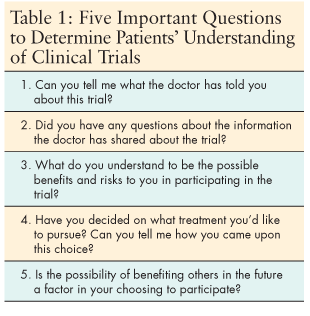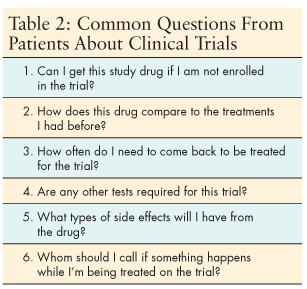The Oncology Nurse's Role in the Informed Consent Process
Cancer clinical trials are a necessary component of the effort to improve cancer prevention, diagnosis, and treatment. Essential to this process is the informed consent of the individuals who participate in these research studies. The purpose of this article is to describe patient, provider, and informed consent process issues with presentations of data reported in the current literature. The role of nursing in the facilitation of informed consent is discussed.
Cancer clinical trials are a necessary component of the effort to improve cancer prevention, diagnosis, and treatment. Essential to this process is the informed consent of the individuals who participate in these research studies. The purpose of this article is to describe patient, provider, and informed consent process issues with presentations of data reported in the current literature. The role of nursing in the facilitation of informed consent is discussed.
Clinical trials are a fundamental link between discoveries in the laboratory and improved cancer treatment and prevention strategies. Conducted in a variety of settings, clinical trials examine the safety and efficacy of new agents, drug combinations, surgical and radiology procedures, and screening and therapeutic devices. Cancer clinical trials rely on patient participation; however, data indicate that only 1% to 3% of eligible adult cancer patients participate in trials. Reasons for this low participation rate are complex; this article will focus on ethical issues and the role of oncology nurses in the informed consent process.

Clinical trials are a necessary component in translating investigational cancer therapeutics into standard care.[1] The informed consent process is important in clinical trials as patients receive treatments that may not provide individual benefit but may advance knowledge for others to be treated in the future. The informed consent process requires that potential study participants are provided with clear, understandable information so that they are able to make an informed decision. This information includes the disclosure of the purpose of the study; basic design features, such as randomization, blinding, and placebo controls; risks and benefits of research procedures; and alternatives to research participation.
The initial informed consent process is also an appropriate time to address any misconceptions and allay unfounded fears of potential trial participants.[1] This is important since patients who participate in clinical trials have often exhausted other treatment options, they often have advanced disease, and they may be vulnerable to unfounded fears as well as to unrealistic hopes for cure of their disease. The informed consent process is not a one-time interaction that ends when the informed consent document is signed, but rather it is an ongoing process designed to provide patients with continuing dialogue and ready access to information.
As part of the oncology team, nurses are in a position to assist cancer patients in making well-informed decisions about whether to enroll in clinical trials.[1] Such nursing interactions include helping patients gather additional relevant sources of information, describing patients' roles and rights in studies, encouraging patients to define their own reasons for participating in clinical trials, and supporting patients in making decisions that correspond with their personal values and wishes, including not participating in a clinical trial.[2]
Elements of Informed Consent
The consent process is intended to give trial subjects an informed opportunity to choose whether or not to participate. To this end, the informed consent process should contain several key elements:
• Adequate disclosure of information (diagnosis, nature and purpose of treatment, risks involved, and alternative treatments);
• Freedom of choice (free of any coercion or promises of benefits which may not be fulfilled);
• Comprehension of the information (an understanding of what has been said);
• Capacity for decision-making; and
• Consent.[3-6]
In providing consent, the patient authorizes the physician to enroll him in research.[4,7]
Understanding the Patient's Expectations
Oncology nurses play a vital role in helping patients understand their opportunities for participating in clinical trials. Some patients choose to be altruistic and enroll in clinical trials in order to benefit others and advance medical knowledge.[8,9] However, we know that self-interest is a primary motivation to participate in clinical trials-the hope of receiving better care or a novel treatment available only in a clinical trial.
Cox et al[10] conducted a qualitative study to identify the psychosocial impact of participating in clinical trials as experienced by the patients themselves. The study sought to interpret patients' ways of coping with their individual situations, and also to identify the various consequences of trial involvement. Of the 55 patients involved in the study, the offer to participate in a cancer clinical trial was seen as a turning point.
Thirty patients (54%) described the offer of participation as being "the light at the end of a tunnel" because they perceived that hope was offered, and 54% felt special, privileged, pleased, lucky, and honored to have been offered participation. On the other hand, 58% of subjects described how the trial offer generated uncertainty. The majority of patients interpreted the offer of trial participation as being the right plan of action because their physicians presented them with the opportunity. Reasons for patients to accept trial participation include the desire to be in expert hands (54%) and to help others (52%).[10]
Among patients who do enroll in trials, several studies suggest that shortcomings persist in comprehension of treatment procedures involved during the course of clinical trials. Joffe and colleagues[11] found that although patients were satisfied with the informed consent process, many did not fully understand at least one of the following: 1) awareness of standard treatment, 2) potential for incremental risk or discomfort, 3) the unproven nature of treatment, and 4) the uncertainty of benefits to self.
Similarly, Daugherty and colleagues[12] found that 93% of participants in phase I clinical trials reported understanding most or all of the information provided, but only 31% of those questioned were able to explain accurately the purpose of phase I studies, which primarily determine the pharmacologic actions of drugs in humans and the side effects associated with increasing doses.
Provider Perspectives
Collaborative communication between provider and patient is critical to the success of informed consent. Although critical information such as treatment procedures, risks versus benefits, and possible out-of-pocket costs is usually standard in the informed consent documents, a patient's signature alone does not constitute an informed consent. The manner and context in which the information is conveyed are almost as important as the information itself; that is, effective communication needs to occur.[6]
Brown and colleagues[13] evaluated ethical communication strategies to guide oncologists in discussing clinical trials with patients. Three key areas were considered essential to seeking informed consent in an ethical manner:
• Shared decision-making based on open discussion and disclosure of evidence-based medicine to share treatment recommendations;
• Avoidance of coercion; and
• Type and clarity of information.
Physician attitudes toward cancer clinical trials also play a crucial role in the informed consent process. Studies have shown that physicians sometimes perceive clinical trials as conflicting with clinical judgment skills.[8] Many physicians have difficulty acknowledging uncertainty regarding treatment benefits or discussing treatment choices with patients, which oftentimes would include enrolling in a clinical trial.[8] Other physician-related barriers include concerns regarding patient-physician relationship, belief that doctors should make the decisions, and the feeling of tacitly coercing patients to participate.[14]
The Nurse's Role
Nurses play multiple roles in disseminating information related to informed consent and clinical trials.[15] As patient and family educators, nurses provide explanations of highly complex and intricate protocols using patient-friendly language instead of difficult medical jargon.[16] Nurses frequently outline the specific protocol process, expectations at each stage, possible side effects, and the importance of the patient communicating any changes in his or her health status to practitioners.
Outside resources can improve nurses' familiarity with the informed consent process and offer tools to help them better communicate with patients. The National Cancer Institute (NCI) provides extensive resources for providers and patients in understanding the informed consent process (http://www.cancer.gov/clinicaltrials/conducting/informed-consent-guide).
The American Cancer Society also provides useful resources on clinical trials (www.cancer.org). After a physician initiates discussion of clinical trial enrollment, the oncology nurse involvement with the patient and family offers a seamless transition and an opportunity for nurses to gauge the patient's initial level of understanding as well as provide a contact liaison for the patient and family. When discussing informed consent documents, nurses should encourage patients to clarify their reasons (eg, physical, psychological, social, spiritual) behind decisions to participate. In assessing a patient's knowledge of clinical trials, nurses should direct questions based on the physician's previous explanation of the trial. Most importantly, nurses also should encourage dialogue around the patient's specific expectations from participating in the trial. The role of the nurse is not to "sell" the study, but rather to inform and support patients in their decisions. Table 1 provides questions that nurses can use to determine a patient's level of comprehension about the clinical trial.

Nurses should also be ready to provide clear and thorough answers to patient's questions regarding clinical trials. Patients generally want comprehensive information about the study drug, treatment schedule, and possible side effects. Most importantly, the nurse must discuss in detail the treatment schedule required for the clinical trial. It is not uncommon for trial participants to have numerous blood draws as well as other baseline laboratory tests, scans, and biopsies while on study. This potentially burdensome aspect of trial participation should be discussed in advance in order to allow patients and family time to plan for transportation needs and schedules. Table 2 provides a list of common questions from patients regarding their participation in clinical trials.

Initial discussions with the patient about a clinical trial include an oncologist as well as an oncology nurse and may also include others such as a social worker, patient representative, and/or staff psychologist. The information should be given logically and at a comfortable pace, with plenty of time allowed for the potential participant to consider it and ask questions. At the end of this encounter, the nurse should be available by phone or other modes of communication if participating patients need continuing dialogue regarding the clinical trial. This support system should continue until the completion of the entire informed consent process.
Strategies such as follow-up phone calls or emails while patients are considering clinical trial participation can have a positive effect on their decision-making process.[16] Aaronson et al[2] conducted a study to test the efficacy of telephone-based nursing intervention on improving the effectiveness of the informed consent process in cancer clinical trials. This randomized study compared the effectiveness of telephone-based intervention in patients who were randomized to standard informed consent procedures based on verbal explanation and written information or the standard informed consent process plus the supplementary telephone intervention. The results demonstrated that the intervention group was significantly better informed about the following: 1) the risks and side effects of treatment, 2) the clinical trial context of the treatment, 3) the objectives of the clinical trial, 4) where relevant, the use of randomization in allocating treatment, 5) the availability of alternative treatments, 6) the voluntary nature of the participation, and 7) the right to withdrawal from the clinical trial. The intervention did not have any significant effect on patients' anxiety levels nor on the rates of clinical trial accrual.[2]
Summary
Over the years, the role of oncology nursing in clinical trials has expanded. Nurses are now integral members of most research teams and are ideally positioned to provide patients with important information regarding informed consent. Nurses involved in clinical trials must enhance patient understanding through effective communication about the goals of clinical research and the treatment procedures, and they must assess patients' understanding of the informed consent information.[17,18] This contribution will result in ethical conduct of research and, in turn, benefit the overall quality of cancer care.
References:
1. Barrett R: A nurse's primer on recruiting participants for clinical trials. Oncol Nurs Forum 29(7):1091-1098, 2002.
2. Aaronson NK, Visser-Pol E, Leenhouts G, et al: Telephone-based nursing intervention improves the effectiveness of the informed consent process in cancer clinical trials. J Clin Oncol 14(3): 984-996, 1996.
3. Ascension Health. Principle of Informed Consent. Available at: http://www.ascensionhealth.org/ethics/public/key_principles/informed_consent.asp. Accessed 5/22/07.
4. Beauchamp TL, Walters L. Contemporary Issues in Bioethics, 6th ed. Belmont, CA, Wadsworth, 2003.
5. Stagno S, Zhukovsky D, Walsh D: Bioethics: Communication and decision-making in advanced disease. Semin Oncol 27(1):94-100, 2000.
6. Albrecht T, Franks M, Ruckdeschel J: Communication and informed consent. Curr Opin Oncol 17(4):336-339, 2005.
7. Beauchamp T, Childress J. Principles of Biomedical Ethics, 5th ed. New York, Oxford University Press, 2001.
8. Ellis PM: Attitudes towards and participation in randomized clinical trials in oncology: A review of the literature. Ann Oncol 11(8):939-945, 2000.
9. Schain WS: Barriers to clinical trials. Part II: Knowledge and attitudes of potential participants. Cancer 74(9 suppl):2666-2671, 1994.
10. Cox K: Enhancing cancer clinical trial management: Recommendations from a qualitative study of trial participants' experiences. Psycho-oncology 9(4):314-322, 2000.
11. Joffe S, Cook EF, Cleary PD, et al: Quality of informed consent in cancer clinical trials: A cross-sectional survey. Lancet 358(9295):1772-1777, 2001.
12. Daugherty C, Ratain MJ, Grochowski E, et al: Perceptions of cancer patients and their physicians involved in phase I trials. J Clin Oncol 13(5):1062-1072, 1995.
13. Brown RF, Butow PN, Butt DG, et al: Developing ethical strategies to assist oncologists in seeking informed consent to cancer clinical trials. Soc Sci Med 58(2):379-390, 2004.
14. Mills EJ, Seely D, Rachlis B, et al: Barriers to participation in clinical trials of cancer: A meta-analysis and systematic review of patient-reported factors. Lancet Oncol 7(2):141-148, 2006.
15. Ocker BM, Plank DM: The research nurse role in a clinic-based oncology research setting. Cancer Nurs 23(4):286-292, 2000.
16. Barrett R: A nurse's primer on recruiting participants for clinical trials. Oncol Nurs Forum 29(7):1091-1098, 2002.
17. Barrett R: Quality of informed consent: Measuring understanding among participants in oncology clinical trials. Oncol Nurs Forum 32(4):751-755, 2005.
18. Schutta KM, Burnett CB: Factors that influence a patient's decision to participate in a phase I cancer clinical trial. Oncol Nurs Forum 27(9):1435-1438, 2000.
Late Hepatic Recurrence From Granulosa Cell Tumor: A Case Report
Granulosa cell tumors exhibit late recurrence and rare hepatic metastasis, emphasizing the need for lifelong surveillance in affected patients.